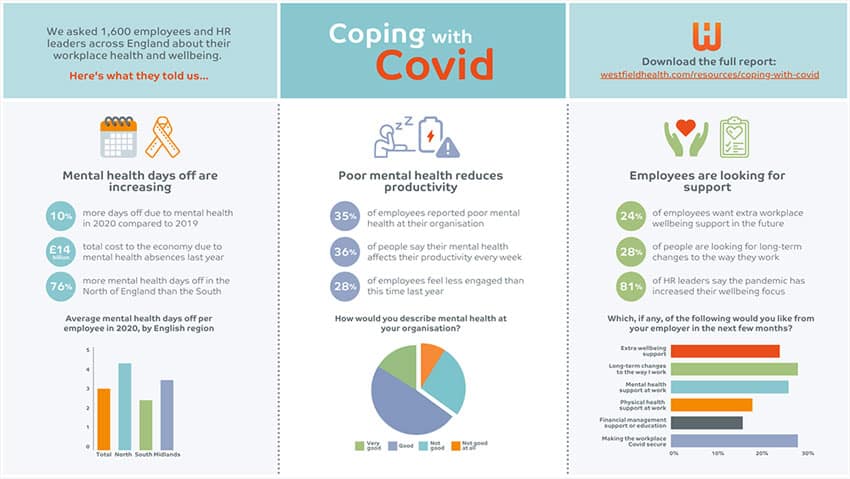Last week we unveiled our latest research into the effects of Covid-19 on workplace health and wellbeing. The independent survey asked over 1,600 employees and HR leaders across England about their experiences of the pandemic, including their mental health, productivity and employer support.
In the first of two reports, released during the UK’s third national lockdown, we explore Covid’s impact on businesses. It entails how robust wellbeing support – from the right people – can help your employees cope.
As decision-makers look towards recovery, it’s important to first take stock of employee wellbeing as it stands today. Afterall, a well-supported workforce will be better prepared to bounce back.
For those who like to get straight to the point, here are the key findings from Coping with Covid: The hidden cost to businesses (and their people).
Covid-19 has made wellbeing more important
Our research reveals that wellbeing is becoming a real priority for HR teams, with 81% saying they increased their wellbeing spend due to the pandemic.
HR leaders are keen to offer enhanced support, with 84% saying wellbeing is getting more important. Over a third (36%) planning to increase their wellbeing spend further throughout 2021.
With a quarter of employees looking for further mental health support at work, this is certainly a step in the right direction.
Employees are still struggling
While mental health awareness has been prominent throughout the pandemic, our research reveals the true impact to businesses. Mental health days off increased by 10% in 2020, costing the economy an extra £1.3bn. In addition, 36% of employees felt their mental health affects their productivity on a weekly basis.
Employees report significantly lower levels of morale, wellbeing and productivity compared to HR leaders, suggesting that the true cost of Covid is being masked by presenteeism. Over a third of employees (35%) reported mental wellbeing as ‘not good’ or ‘not good at all’, compared to only 7% of HR leaders.
The worry is that HR and leadership teams are not seeing the full cost of Covid’s mental health and wellbeing impact on businesses. While absences can be measured through the payroll system, days lost to low productivity are more difficult to track.
HR and line managers can provide vital support
Although the disconnect between employees and HR is troubling, it reveals a real opportunity to boost productivity across the workforce.
The survey revealed that 24% of employees are looking for further wellbeing support. 28% want long-term changes to the way they work.
The report explores a number of ways to engage your team with wellbeing during the pandemic. From building connections and listening with empathy, to virtual events and Zoom coffee breaks, a ‘little and often’ approach can have a huge impact on employee morale.
Changes in employee mental health are usually spotted by those who work closely together. Colleagues and line managers should be the ‘first responders’ to many wellbeing issues.
Download our free Coping with Covid key findings

To read our in-depth analysis of the survey results you can download the full report for free. We also have four regional factsheets outlining the impact of Covid throughout England.
Download Coping with Covid:
the hidden cost to businesses (and their people)